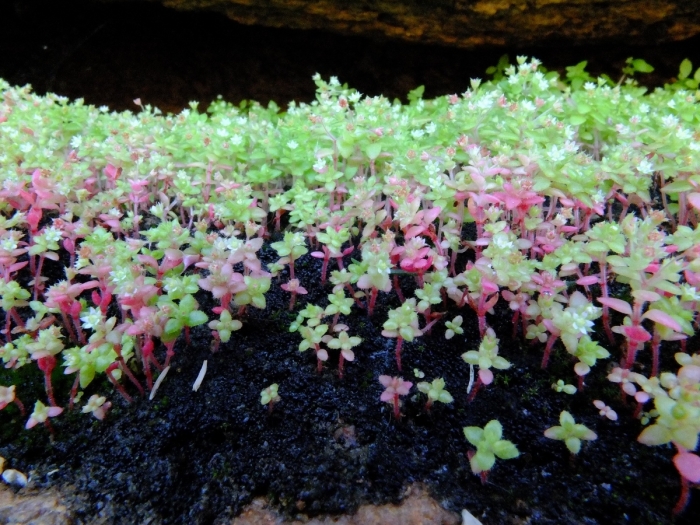Pigmyweed
(Crassula strigosa)
Pigmyweed (Crassula strigosa)
/
/

Kevin Murray
CC BY 4.0
Image By:
Kevin Murray
Recorded By:
Copyright:
CC BY 4.0
Copyright Notice:
Photo by: Kevin Murray | License Type: CC BY 4.0 | License URL: http://creativecommons.org/licenses/by/4.0/ | Rights Holder: Kevin Murray | Publisher: iNaturalist | Date Created: 2016-08-23T15:35:20-07:00 |






























Estimated Native Range
Summary
Crassula strigosa, commonly known as Pigmyweed, is an evergreen succulent native to the rocky outcrops and slopes of the Eastern Cape Province in South Africa. It typically reaches a height and width of 0.5 to 1 foot (0.2 to 0.3 meters), forming dense mats of fleshy, cylindrical leaves. The plant produces clusters of small, star-shaped white to pale pink flowers during the summer months, which add a delicate touch to its appearance. The flowers are modest in size but can be quite numerous, creating a noticeable display against the green foliage.
Pigmyweed is valued for its drought tolerance and its ability to thrive in poor soils, making it an excellent choice for rock gardens, succulent collections, and as ground cover in xeriscaped areas. Its low water requirements and ability to grow in full sun to part shade make it a versatile plant for gardeners dealing with arid conditions. While it is not commonly used for culinary or medicinal purposes, its unique texture and form make it a visually interesting addition to container plantings and indoor arrangements. Care should be taken to avoid overwatering, as this can lead to root rot. Pigmyweed is not known for aggressive roots or significant disease problems, but it may be susceptible to mealybugs and fungal diseases if kept in overly moist conditions.CC BY-SA 4.0
Pigmyweed is valued for its drought tolerance and its ability to thrive in poor soils, making it an excellent choice for rock gardens, succulent collections, and as ground cover in xeriscaped areas. Its low water requirements and ability to grow in full sun to part shade make it a versatile plant for gardeners dealing with arid conditions. While it is not commonly used for culinary or medicinal purposes, its unique texture and form make it a visually interesting addition to container plantings and indoor arrangements. Care should be taken to avoid overwatering, as this can lead to root rot. Pigmyweed is not known for aggressive roots or significant disease problems, but it may be susceptible to mealybugs and fungal diseases if kept in overly moist conditions.CC BY-SA 4.0
Plant Description
- Plant Type: Succulent
- Height: 0.5-0.7 feet
- Width: 0.5-1 feet
- Growth Rate: Moderate
- Flower Color: N/A
- Flowering Season: Spring
- Leaf Retention: Evergreen
Growth Requirements
- Sun: Full Sun, Part Shade
- Water: Very Low, Low
- Drainage: Fast
Common Uses
Bee Garden, Bird Garden, Butterfly Garden, Deer Resistant, Drought Tolerant, Fire Resistant, Low Maintenance, Rock Garden
Natural Habitat
Rocky outcrops and slopes of the Eastern Cape Province in South Africa
Other Names
Common Names: Jade
Scientific Names: , Crassula strigosa, Crassula diaphana, Crassula sarcolipes, Crassula sylvatica, Sarcolipes pubescens, Crassula sylvatica var. diaphana, Grammanthes centauroides, Sarcolipes strigosa, Sedum centaurodes
GBIF Accepted Name: Crassula strigosa L.